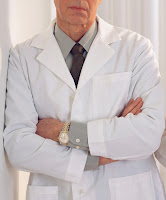 Between board exams, clinical rotations and setting up residency interviews, this year promises to be busier than the last. All efforts up until this point have been paving the way for residency interviews and applications.
Between board exams, clinical rotations and setting up residency interviews, this year promises to be busier than the last. All efforts up until this point have been paving the way for residency interviews and applications. Strengthening Your Application
I recently came across various data sets provided by the National Resident Matching Program (NRMP). It's not enough to present yourself well and make good with everyone you meet on the interview trail. To complement your in-person encounter, the chart above highlights the power-packed characteristics that program directors are looking for when they see you on paper. These are the 2010 NRMP program director mean importance ratings of factors in ranking applicants.
As reported, the strongest assets in your file will be letters of recommendation, grades and honors in your desired specialty. Step 1 scores, class rank, and strong performance on clerkships are close behind. It is worth noting that the personal statement, life experiences, and research have less of an impact on how we are evaluated, but play a small role nonetheless. In my opinion, if the evaluation criteria made its way onto this report it is in your best interest to consider developing that attribute on your application.
Interestingly, "other post-interview contact" was ranked rather low on this report, yet it has made its way onto the list. A well-placed phone call or hand-written card of appreciation would be an effective way to strengthen your candidacy. In fact it is probably one of the simplest, most inexpensive and least time consuming action we can take in our favor.
This is definitely an exciting and stressful time for all who are at this stage. Enjoy the challenge and make the most of your third and fourth years. Good luck to those preparing for the upcoming match and to everyone who will be on the interview trail in a matter of months.If you are interested in viewing information regarding a specific specialty or other reports, visit the NRMP website.
Question of the Week
A third year medical student is stressing out about upcoming exams, residency and career choices. He simultaneously blogs about his life as a medical student. Each week he writes or finds a question to pose at the end of his posts, yet wonders if these questions are of any benefit. What should be his next step?
A. Seek psychiatric counseling to address his stressorsB. Put an end to the "Question of the Week"C. Accept reader submitted questionsD. Continue posing weekly questionsAnswers & Explanations (post as a comment)







